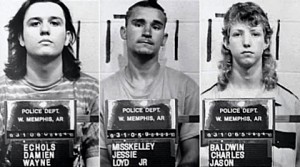Remembering the West Memphis Three

Damian Echols, Jesse Misskelley, and Jason Baldwin at ap ress conference moments after being released
It was two years ago that the West Memphis Three were released from prison. Now, two years might seem like a long time to you and me but when you have spent almost two decades in prison I’m sure two years feels like a drip.
In 1994, the West Memphis Three — Damien Echols, Jason Baldwin, and Jesse Misskelley — were convicted of the 1993 murders of three eight year old boys, Chris Byers, Steve Branch, and Michael Moore — apparently as part of a satanic ritual. Echols, the then 18-year old ringleader was sentenced to death whilst the 16-year old Baldwin and 17-year old Misskelley were sentenced to life imprisonment.
The bodies of the eight-year old boys were found hogtied with shoelaces in a drainage ditch in Robin Hood Hills near West Memphis, Arkansas. In the midst of a nationwide fear of satanic rituals the police identified a couple of teenagers who wore black clothes and listened to heavy metal music as prime suspects.
Originally bought in as a witness, Jesse Misskelley, a boy with low intelligence, was interrogated for twelve hours without a guardian or lawyer present. He was coerced into a false confession that also implicated Echols and Baldwin, that at times had inconsistencies with itself and the crime scene. The three teenagers who became known as ‘The West Memphis Three’ were charged with the three murders. Misskelley’s trial was heard first and in February 1994 he was found guilty and sentenced to life on the inside.
Echols’ and Baldwin’s trials were held together soon after. Armed with a sketchy police investigation, a side show of apparent expert witnesses (witnesses who would later recant their stories), a bunch of circumstantial evidence and a book on Wicca found at Echol’s abode (remember, Wicca is different to Satanism), the prosecution managed to sway the jury towards guilty convictions. Judge David Burnett sentenced Baldwin to life and Echols to death.
A documentary crew there to chronicle how a group of teenagers could commit such evil acts began to notice oddities in the case and began to change their original vision of their documentary, which went on to be called Paradise Lost: The Child Murders at Robin Hood Hills, bringing international attention to the case. The documentary marked the first time that metal band, Metallica permitted their music for use in a movie.
As the years went on the ‘Free the West Memphis Three’ movement grew with many benefit gigs and celebrities such as Peter Jackson, Johnny Depp, Henry Rollins, The Dixie Chicks and Margaret Cho joining the plight. Perhaps the most vocal celebrity endorser was Pearl Jam’s Eddie Vedder who often donned West Memphis Three t-shirts and incorporated West Memphis Three lyrics into songs at concerts. Whilst support of the WM3 grew, in the court room appeals and post-conviction hearings were denied which halted the Three’s quest for exoneration.
In 2007, DNA collected from the crime scene was tested, the result showing no DNA matches to the West Memphis Three, but found a hair follicle “not inconsistent” with Steve Branch’s step father Terry Hobbs as well as evidence showing that markings on the victims bodies were made by animals in the area. Echol’s lawyers filed papers with the court to have the matter reheard along with Echol’s release immediately from prison. Alarmingly, the application came before the original trial judge, Judge Burnett, who rejected the evidence, citing the DNA testing as inconclusive and denied the application for retrial.
It was around this time that many believers of the West Memphis Three’s guilt began to change their opinion. John Mark Byers, father of victim Chris Byers and the most vocal supporter of the WM3 guilt became a vocal supporter of their innocence and Pamela Hobbs, mother of Steve Branch publicly called for the verdicts to be reopened.
A year later it was revealed that the foreman of the jury who was desperate to convict had bought up Jesse Misskelley’s confession (which had been ruled inadmissible) during deliberations, in an attempt to sway undecided members of the jury. In 2010 the Arkansas Supreme Court ordered the judge in the lower court to examine whether the new DNA evidence could exonerate the Three as well as investigate the alleged misconduct by the jurors in the Echols and Baldwin trial. It wasn’t until Judge David Laser replaced Judge David Burnett that the application began to gain some steam and the appeal to rehear the matter was successful.
In August 2011, after weeks of negotiation, in a courtroom packed with celebrities, people involved with the case and media, Judge Laser vacated the previous verdicts so that Echols, Baldwin, and Misskelley, now in their mid-30s, could enter Alford Pleas — essentially a guilty plea although the defendant proclaims their innocence, because it is in their best interests to. Judge Laser accepted those pleas and released the three due to time already served.
There they were, after a little more than eighteen years in prison and on death row; Echols, Baldwin and Misskelley, finding themselves leaving the courtroom, this time not in shackles, but rather jumping into a SUV with Eddie Vedder and driving down the street to freedom. Initially Jason Baldwin was against the idea of an Alford Plea as he wanted to maintain his innocence, however he changed his mind when he realized what it would mean to Echols. John Mark Byers, who was at the hearing said “three young men have had 18 years of their lives taken away” before adding “to see them get out and have a normal life is a blessing from God”.
A lot has changed in eighteen years. Echols and Baldwin were seen running around parties snapping pictures on smartphones, totally amazed at the technology we take for granted. Integration back into the real world wasn’t easy.
But why the guilty pleas, you may ask? Well, the answer is simple. Ultimately it works for the West Memphis Three because it was a quick resolution to eighteen years of fighting whilst being in prison. Though they may be able to win at a rehearing there was no guarantee that they would and all three would remain in custody whilst waiting for the trial dates. But the big win is for the State of Arkansas who by being able to keep the convictions get to keep the file closed. That helps with the clearance rate, especially staring down the barrel of a retrial which would introduce DNA evidence, witnesses who recanted their stories, alleged juror misconduct and a sketchy case (it isn’t every day they release a convicted killer on death row back into society). The state also no doubt saves potentially millions of dollars in three wrongful imprisonment cases too.
Damien Echols now lives in Salem with his wife, writing books on his life, tinkering in art and guest speaking across the United States. Jason Baldwin is living in Seattle with his girlfriend and is working towards a law degree and, Jesse Misskelley went back to West Memphis to be near his father, became engaged and studied to become an auto mechanic.
To learn more about the West Memphis Three, do yourself a favor and locate the Paradise Lost documentary trilogy and head over to the West Memphis Three support fund group, http://www.wm3.org.
Like us on Facebook for more!



